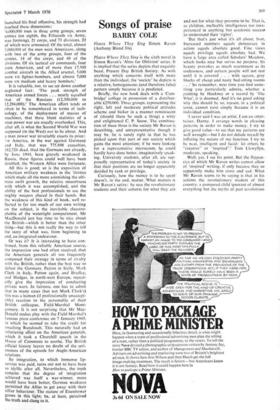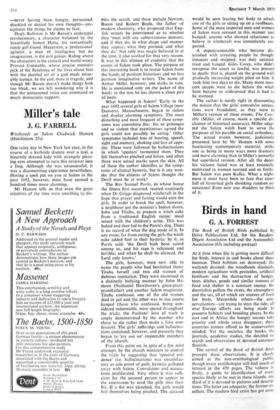Songs of praise
BARRY COLE
Places Where They Sing Simon Raven (Anthony Blond 30s) Places Where They Sing is the sixth novel in Simon Raven's 'Alms for Oblivion' series. It is implied that the series depicts that ungainly beast, Present Day British Society. As with anything which concerns itself with more than the individual, the 'society' he depicts is a relative, homogeneous (and therefore false) pattern simply because it is predicted.
Briefly, the new book deals with a 'Cam- bridge' college in possession of a distribut- able £250,000. Three groups, representing the right, left and moderate political attitudes scheme and bicker in a manner reminiscent of (should there be such a thing) a witty and enlightened C. P. Snow. The combina- tion of these three is the society Mr Raven is describing, and unrepresentative though it may be, he is surely right in that he has picked upon that part of our society which gains the most attention; if he were looking for a representative microcosm, he could hardly have done better, imaginatively speak- ing. University students, after all, are sup- posedly representative of today's society in that their positions are no longer apparently decided by rank or privilege.
Curiously, how the money is to be spent doesn't, in the end, matter. What matters is Mr Raven's satire: he sees the revolutionary students and their cohorts for what they are
and not for what they presume to be. That is, as children, malleable intelligences too inex- perienced in anything but academic success to understand their 'rights'.
`But that's just what it's all about, Ivor. Increased numbers equals democracy in action equals absolute good. Fine views equals privilege equals absolute bad. We have a large area called Scholars' Meadow, which looks nice but serves no purpose. Its beauty provokes as much resentment as its uselessness, and certain people will not rest until it is covered . . . with square, grey blocks of cheap and nasty bed-sitting rooms . . .' So remember, next time you find some- thing you particularly admire, whether a painting by Hockney or a record by The Who', it is doomed. And it's no good asking why this should be so; reason, in a political sense, cannot exist simply because it is an individual condition.
'I never said I was an artist. I am an enter- tainer, Danny. I arrange words in pleasing patterns in order to make money. I try to give good value—to see that my patterns are well wrought—but I do not delude myself by inflating the nature of my function. I try to be neat, intelligent and lucid: let others be "creative" or "inspired".' Tom Llewyllyn, moderate, speaking.
Well, yes, I see his point. But the flippan- cies of which Mr Raven writes cannot allow of 'inspired' writing, if only because they so apparently make him cross and sad. What Mr Raven seems to be saying is that in his actions the revolutionary student of this country, a pampered child ignorant of almost everything but the myths of past revolutions —never having been hungry, persecuted, shackled or denied his own thoughts—pre- cipitates the things he claims to fear.
Hugh Balliston is Mr Raven's archetypal revolutionary, a character balanced by the beautifully honest Hetta, his romantically randy girl-friend. Mayerston, a 'professional' agitator, a man of intelligence but no imagination, is the evil genius. Riding above the characters is the cynical and world-weary Provost Constable, whose precise memoirs pick at the flatulence of the lives about him with the puzzled air of a god made miser- ably human. In the end, there is tragedy, and though Mr Raven doesn't make things look too bleak, we are left wondering why it is that the unreasoned voice can command so much democratic support.



































 Previous page
Previous page